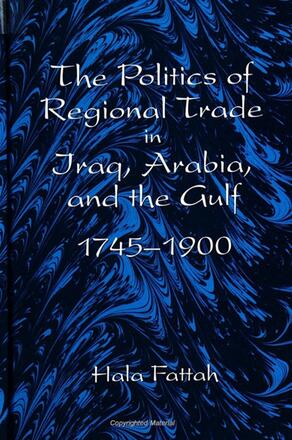
The Politics of Regional Trade in Iraq, Arabia, and the Gulf, 1745-1900
Alternative formats available from:
Examines the development of a socioeconomic region in Iraq, Arabia, and the Gulf during a 150-year period, focusing on regional ties through long-distance trade networks.
Description
This history of trade in Iraq, Arabia, and the Gulf basin over the course of 150 years establishes the interconnectedness of the Gulf region by charting the regional ties that bound disparate districts together through long-distance trade networks. Hala Fattah redraws the parameters of the history of this area, tracing the social history of the regional market from its beginnings to its last-ditch efforts to stand up to the onslaught of superior firepower, more efficient technology, and the inexorable rise of the world market.
Hala Fattah, currently an independent scholar, was Visiting Assistant Professor at Georgetown University in both the Center for Contemporary Arab Studies and the History Department.
Reviews
"This is an extraordinarily important study that is pathbreaking not only in its overall conceptualization but also in its extensive and intelligent use of Iraqi and other Gulf sources. There is nothing quite like it in the existing literature, virtually guaranteeing that it will make a splash, at least in scholarly circles." -- Fred Lawson, Mills College
"This is a most interesting book. The author has used sources which are quite unknown to most historians of the Ottoman Empire, namely local histories produced by scholars close to the nineteenth-century Saudi dynasty, or else to the latter's rivals. It is Dr. Fattah's great merit to have confronted these texts with the more conventional British diplomatic sources concerning the Gulf area. She has thereby managed to evaluate critically what these two groups of sources express and explain or fill in what they choose to be silent about. Dr. Fattah is also aware of secondary literature not often consulted by historians dealing with the Ottoman Empire, namely the work of C. A. Bayly, K. N. Chaudhuri, and Sanjay Subrahmanyam on Indian trade and politics. She is therefore able to bring a broad transregional perspective to her material." -- Suraiya Faroqhi, Nahost Institute, Ludwig-Maximilians University, Germany
"Hala Fattah's work is significant for a number of reasons. For specialists in the field it provides a fresh approach to the history of the area outside the traditional historiography of Middle Eastern states. It would be an excellent tool for teachers attempting to communicate the dynamism of tribal history in Arabia and Iraq to their students. And it would also provide a useful text for social scientists and political geographers who are trying to find material that supports the highly theoretical and jargon-filled articles and monographs about the malleability of borders and the pitfalls of state-centered and elite analyses. The strength of the book lies in the ability of its author to discuss in clear prose a topic that is at the center of current debates on the impact of the global market and state modernizing policies on 'peripheral populations.'" -- Dina Rizk Khoury, George Washington University